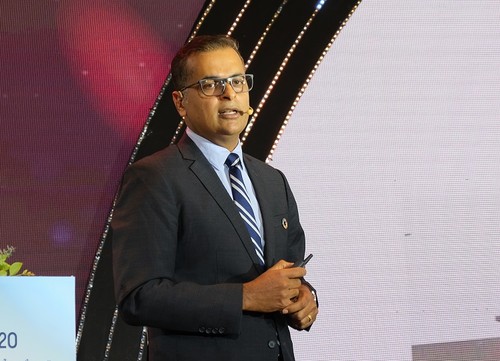 Binu Jacob, general director of Nestlé Vietnam (Photo by Thanh Duong) Binu Jacob, general director of Nestlé Vietnam (Photo by Thanh Duong) |
Completely eliminating emissions is one of the goals of Nestlé Vietnam, Binu Jacob, general director of Nestlé Vietnam and co-chairman of the Business Council for Vietnam Sustainable Development (VBCSD), said at the 2020 Vietnam Business Forum for Sustainable Development last week.
The event was attended by Deputy Prime Minister Vu Duc Dam, officials from several ministries and executives from businesses who share concerns about sustainable governance, the circular economy, climate change, and public-private partnerships.
"By 2030 the company will not let any activities impact the environment and halve the amount of carbon emissions and achieve complete elimination of emissions by 2050," Jacob said.
He said since 2018 all Nestlé Vietnam factories have stopped discharging effluents thanks to recycling and reusing wastewater and waste.
In 2011 Nestlé's sustainable coffee development project saw the distribution of over 46 million disease-resistant, high-yield seedlings to farmers to replace 46,000 hectares of old coffee plants.
The project has helped reduce the use of irrigation water and chemical fertilizers and pesticides by 40 percent and 20 percent respectively.
The ‘Dynamic Vietnam’ program has popularized physical exercise among more than 2.5 million children.
Holly Bostock, director of foreign affairs, Heineken Vietnam Brewery Co., Ltd., said the company applies a sustainable model named ‘Resolve,’ which stands for Regenerate, Share, Optimize, Loop, Virtualize, and Exchange.
Heniken converts 99 percent of waste, which almost comes from brewing, for use as animal feed at farms. The company also encourages agents and consumers to reuse bottles and cans at least 20 times.
Do Thai Vuong, vice president of external affairs and sustainable development, Unilever International Vietnam Co., Ltd., said two of the company’s factories have been using renewable energy and recycling water for reuse, and do not discharge effluents.
A study by Vietnam Chamber of Commerce and Industry (VCCI) found that enterprises that apply sustainable development will achieve better business results, higher labor productivity and better benefits for employees.
"The VCCI will continue to improve the set of indicators for sustainable development to suit all types of businesses, especially small and medium-sized enterprises and microenterprises," Vu Tien Loc, President of Vietnam Chamber of Commerce and Industry, said.